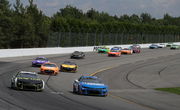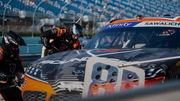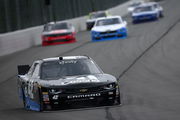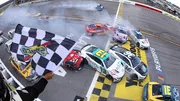
USA Today via Reuters
Daytona Beach, Florida, USA; NASCAR Cup Series driver Michael McDowell (34) leads NASCAR Cup Series driver Chase Elliott (9) and Austin Dillon (3) to win the during the Daytona 500 at Daytona International Speedway. Mandatory Credit: Mark J. Rebilas-USA TODAY Sports

USA Today via Reuters
Daytona Beach, Florida, USA; NASCAR Cup Series driver Michael McDowell (34) leads NASCAR Cup Series driver Chase Elliott (9) and Austin Dillon (3) to win the during the Daytona 500 at Daytona International Speedway. Mandatory Credit: Mark J. Rebilas-USA TODAY Sports
Every lap of the Daytona 500 sees history being written. This classic race, ingrained in NASCAR culture, has seen decades of intense rivalry, technical advancement, and legendary drivers leaving their marks on the prized 2–5-mile racetrack. Every manufacturer brings a different narrative to the fast-paced battlefield, from the long-standing dominance of Ford and Chevy to the more recent ascent of Toyota. Hold on tight as we honor the manufacturers who have left a lasting impression on NASCAR’s most esteemed race and honor the true kings of Daytona.
Leading the Grid: Chevrolet: 25 wins at the Daytona 500
Chevrolet, one of the prominent manufacturers in NASCAR, has showcased a dominant performance at the Daytona 500 over the past 65 years. The Great American Race has witnessed plenty of Chevrolet triumphs, with the manufacturer accumulating a total of 25 wins, with last year’s victory for Ricky Stenhouse Jr‘s #47 Camaro ZL1 making them the defending champions. His journey at the Daytona 500 began in 1960 when Junior Johnson secured his first victory and his only triumph in the historic race with his 59′ Chevy.
ADVERTISEMENT
Article continues below this ad
One of the standout periods for Chevrolet came in the 1990s and 2010s when the General Motors-backed manufacturer clinched victories in 15 out of 20 races. The prowess of Chevrolet during this era is exemplified by drivers like Sterling Marlin, Jeff Gordon, and Michael Waltrip winning multiple editions of the flagship event behind the wheel of a Chevy. Ironically, Michael Waltrip’s older brother, Darrell, a long-time presenter for FOX and one of NASCAR’s 50 greatest drivers of all time, also won his one and only Daytona 500 title in a Chevrolet Monte Carlo Aerocoupe in 1989.
NASCAR legend “The Man in Black,” Dale Earnhardt, secured his elusive first Daytona 500 victory in 1998, driving a Chevrolet for Richard Childress Racing. This win marked a crucial moment in Chevrolet’s history at the Daytona 500, solidifying their position as a force to be reckoned with on the track. Tragically, on February 18th, 2001, it was also a Chevrolet Monte Carlo that “The Intimidator” was driving when he lost his life crashing into the outer barriers coming out of Turn 4 in the last lap.
As the new millennium dawned, Chevrolet’s dominance persisted. The 2000s saw drivers like Jimmie Johnson, Kevin Harvick, and Earnhardt’s prodigal son, Dale Jr pilot Chevrolet cars to victory at the Daytona 500. The 2010s brought further success for Chevrolet, with drivers like Jamie McMurray and Jimmie Johnson contributing to the manufacturer’s legacy. McMurray’s solo victory in 2010, driving ‘The Car of Tomorrow’ for Earnhardt Ganassi Racing, showcased the versatility and competitiveness of Chevrolet cars at the historic two-and-a-half-mile oval. Additionally, Johnson, a seven-time NASCAR Cup Series champion, added to his Daytona tally with his second win in 2013, driving the #48 for Hendrick Motorsports.
Chevrolet’s recent triumphs at the Daytona 500 include Austin Dillon‘s victory in 2018 and Stenhouse Jr’s recent surprise win in 2023. v In terms of car models, Chevrolet has been associated with various iconic vehicles in the Daytona 500. The Chevrolet Impala, Chevrolet Monte Carlo, and more recently, the Chevrolet Camaro ZL1, have been part of the manufacturer’s arsenal at Daytona. These cars, equipped with powerful engines and advanced aerodynamics, have played a pivotal role in Chevrolet’s success at the track.
Trending
Ford Follows Behind With 17
Ford made its mark in the Daytona 500 early on, with notable wins in the 1960s. In 1963, the legendary Tiny Lund, driving for Wood Brothers Racing, clinched the first victory in a Ford, showcasing the manufacturer’s potential at the high-speed Daytona International Speedway. Ford showcased its dominance further in the following years, claiming victories in 1965 with Fred Lorenzen and in 1967 with the iconic Mario Andretti. 1969’s victory for LeeRoy Yarbrough saw Ford cap it off with 4 Daytona 500 victories in 10 years.
The 1970s and 1980s marked a rollercoaster era for Ford in the Daytona 500. Legendary drivers like A. J. Foyt, Bobby Allison, and Chase Elliott’s father, Bill Elliott, piloted Ford machines to victory. Noteworthy wins during this period include Foyt’s first and only Daytona triumph in 1972 driving a Mercury, a subsidiary production line of Ford discontinued in 2011, and Bill Eillott’s Ford-powered victories in 1985 and 1987. The variety of Ford models and the consistent presence of top-tier drivers indicated Ford’s status as a force to be reckoned with at Daytona.
As the sport entered the 1990s, Ford continued to make its presence felt at Daytona. Bobby Allison’s younger brother Davey secured a win in 1992 driving a Ford for Robert Yates Racing. Additionally, Dale Jarrett also won his second and third Daytona titles in 1996 and 2000, respectively, with Ford & RYR.
The turn of the millennium and the 2000s brought challenges for Ford at Daytona. With Chevrolet securing back-to-back wins from 2003 to 2007, Matt Kenseth ensured Ford’s only presence in the winner’s circle in 2009.
Since 2010, Ford has emerged as one of the most successful manufacturers in the Daytona 500, with seven wins in 13 races. The most crucial factor in Ford’s recent resurgence, however, has been its strategic collaboration with Team Penske. Since 2013, the alliance between Ford and Team Penske has yielded remarkable results. Joey Logano’s dramatic win in 2015 marked the beginning of a dominant era. Kurt Busch’s last victory in 2017 solidified their presence, and Michael McDowell and Austin Cindric’s 2021 and 2022 victories cemented their dominance further.
With 17 wins, Ford’s journey at the Daytona 500 has been one of highs and lows, showcasing moments of sheer brilliance alongside periods of struggle. However, the recent resurgence, fueled by young talent and strategic investments with exciting teams like Penske and RFK, paints a promising picture for the Blue Oval’s future in the Great American Race.
A New Threat at Daytona: Toyota: 3 Wins
Toyota’s initial foray into the 500 in 2007 was regarded with plenty of skepticism. Established manufacturers such as Chevrolet, Ford, and Dodge were dominating the flagship race. Nevertheless, Toyota persevered, forming partnerships with Michael Waltrip Racing and, more importantly, powerhouse Joe Gibbs Racing. The cooperation reaped plenty of rewards, resulting in Denny Hamlin‘s historic split-second triumph in 2016. This win was vital not only for the new manufacturers but for stock-car racing as a whole. It ended traditional manufacturers’ dominance and brought in a new era of international competition.
Hamlin repeated his success back-to-back in 2019 and 2020 in JGR’s #11 Toyota Camry ZL1, further establishing Toyota as a dominant force. These accomplishments solidified the Japanese brand’s dedication to constant innovation and collaboration, sending a strong message that the organization was here to stay and compete for a long time.

USA Today via Reuters
Apr 3, 2022; Richmond, Virginia, USA; NASCAR Cup Series driver Denny Hamlin (11) races NASCAR Cup Series driver Brad Keselowski (6) during the Toyota Owners 400 at Richmond International Raceway. Mandatory Credit: Amber Searls-USA TODAY Sports
While wins create news headlines, Toyota’s impact goes beyond the finish line at Daytona. They have achieved 13 top-10 finishes, displaying their ability to compete at the pinnacle of NASCAR racing. Notably, Joe Gibbs Racing has played a key role in Toyota’s success, fielding all of their winning cars and the vast majority of their top-10 results at Daytona post-2010.
Even though Toyota has made a name for itself, there is still potential for a lot of improvements. To cement their legacy in the 500, they must repeat their early success in terms of top-5 finishes. They must claim victories outside of JGR to quell the outcry of competition. Nevertheless, the roar of Toyota Racing Development engines at Daytona International Speedway is expected to roar just as loud as they evolve their technology, form strategic alliances, and develop fresh talent, ensuring captivating contests for years to come.
Watch This Story: Youngest NASCAR Cup Winners
ADVERTISEMENT
Article continues below this ad
Honorable Mentions: Pontiac & Plymouth, 4 each
While the roar of Toyota engines echoes through the modern Daytona 500, two historic brands deserve a place in the spotlight: Pontiac and Plymouth. These two American muscle car legends etched their names into the annals of the race, resulting in a succession of victories, unforgettable events, and intense rivalry. Also a General Motors subsidiary, Pontiac’s first taste of Daytona success came in 1957, not with the 500 yet, but on the sands of the original Daytona beach course. A modified Pontiac driven by Cotton Owens marked the brand’s first triumph and cemented its name into the history of the emerging affair with the first 100-mph average race on the sand.
The 1960s saw Pontiac truly flex its muscles. In 1961, Marvin Panch, a local hero, steered a Pontiac Catalina to victory in the first official 500 on the newly built Daytona International Speedway.
Plymouth’s Daytona 500 journey began with a bang in 1964. The legendary Richard Petty, piloting a 64′ Plymouth powered by the mighty 426 Hemi engine, dominated the race, leading for 184 laps and securing his first victory on a superspeedway. This marked the beginning of a period of dominance for Plymouth, with the brand claiming two wins—once in 1964 and then in 1966. This dominance was fueled by the Hemi engine, a technological marvel at the time that redefined power and performance on the track. Petty continued to be a major force with Plymouth, adding two more Daytona 500 wins to their tally, once in 1966 and the next in 1971, eventually driving a Dodge for his next win in 1973. Solidifying Plymouth’s legacy as a champion manufacturer.
ADVERTISEMENT
Article continues below this ad
Despite their impressive achievements, both Pontiac and Plymouth eventually faded from the Daytona 500 scene. The oil crisis of the 1970s and shifting automotive priorities led to their withdrawal from NASCAR. Their influence on the race, however, cannot be denied. In addition to pushing the limits of technology in the early stages of the Great American Race, they provided some of the most exhilarating moments in Daytona 500 history and inspired thousands of drivers and those watching.
ADVERTISEMENT
ADVERTISEMENT
ADVERTISEMENT
ADVERTISEMENT






